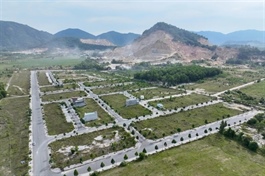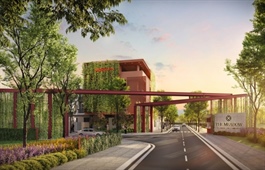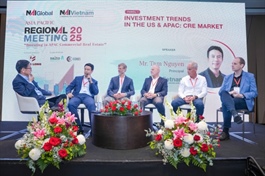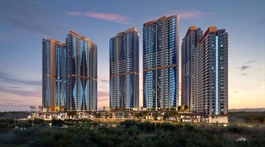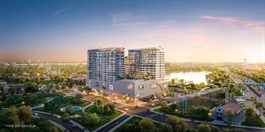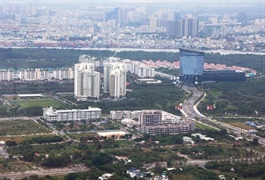Private sector offers up urban potential
Private sector offers up urban potential
Vietnam stands at the forefront of urban transformation, with its cities expanding rapidly and over 40 per cent of the population now living in urban areas, a figure projected to exceed 50 per cent by 2030.

Mai Nguyen, representative to Vietnam International Division, American Planning Association |
As one of Asia’s fastest-growing economies, Vietnam is embracing a bold vision for sustainable, tech-driven urban development. National strategies on green growth, climate resilience, and smart cities are fostering public-private partnerships and innovation-friendly policies. This creates a prime opportunity for private investors to help shape the next generation of Vietnamese cities.
This vision spans multiple sectors, each offering distinct investment prospects and challenges, with varying levels of readiness and investment potential. From smarter mobility and resilient built environments to decentralised clean energy, digital infrastructure, and green finance, Vietnam’s sustainable urban future requires integrated solutions.
Rising urban density and worsening congestion are driving urgent demand for smarter mobility solutions.
Vietnam’s government commitment to emissions reduction and urban transport modernisation creates a compelling market for private innovation. While electric vehicle adoption is gaining momentum, critical infrastructure, such as charging networks, smart traffic management and data-driven logistics remains underdeveloped.
Despite challenges like fragmented data standards and limited inter-agency coordination, Vietnam’s strong policy support and market readiness position it as a prime hub for next-generation, low-emission mobility solutions.
Strategic investments and cross-sector collaboration can unlock significant value while advancing sustainable urban transport.
The anticipated shift to autonomous vehicles further underscores the importance of foundational digital infrastructure. Building robust digital infrastructure, including real-time data networks and vehicle-to-infrastructure communications, is essential for the safe and efficient operation of such vehicles and for their integration into modern cities.
Meanwhile, Vietnam’s urban skyline is evolving rapidly in scale and vision. The focus of urban development is shifting from quantity to quality, emphasising smarter, more sustainable, and inclusive design.
Green and resilient building certifications such as EDGE, BRI, and LEED are becoming increasingly common, reflecting a stronger emphasis on energy efficiency, environmental performance, and resilience.
As sustainable design becomes mainstream, there is growing recognition that the benefits must reach all population segments. Affordable housing has emerged as a critical challenge over the past decade, prompting the government to commit to constructing one million affordable housing units by 2030.
Challenges persist, including high upfront costs, limited land access, slow permitting, and fragmented regulations. Rising construction material prices in the past year or two, driven by supply chain disruptions caused by natural hazards and large-scale infrastructure projects, have further increased real estate costs. Financing gaps remain a significant barrier, especially for affordable housing projects that tend to offer lower returns.
These challenges create opportunities for innovation and investment. Affordable housing offers strong potential for developers and investors to embrace new building technologies, improved land use, and cost-effective, sustainable solutions such as modular construction, green retrofitting, and smart infrastructure.
A transformation is also underway in the energy sector, as cities seek to meet rising demand while reducing carbon emissions. The government aims for net-zero by 2050, driving growth in solar, wind, and battery storage.
However, rapid renewable integration strains the grid, complicating energy distribution and stability. Regulatory uncertainties have slowed clean energy investments.
Urban areas are turning to decentralised solutions, such as battery storage, district cooling, and microgrids, to boost energy security, reduce emissions, and enhance climate resilience. Early microgrid deployments show promises for reliable urban power, though clear policies and technical standards are needed to overcome adoption barriers.
Addressing these barriers through clear policies, technical standards, and incentives will be critical to unlocking the full benefits of urban clean energy systems and supporting Vietnam’s sustainable urban development goals.
Efforts to streamline governance, such as reducing the number of provinces, are enhancing administrative efficiency for urban development. Simultaneously, the country is accelerating digital transformation, expanding 5G, enhancing cloud computing, and building data centres to international standards.
Investment opportunities are growing in areas like 5G, smart utilities, digital twins, and urban Internet of Things applications, all crucial for modernising Vietnam’s cities. These sectors offer strong potential for private investors and tech innovators. However, challenges around data governance, such as privacy, security, and interoperability, and limited coordination between government agencies must be addressed to fully realise these technologies’ benefits.
A stronger financial foundation is taking shape to support Vietnam’s urban agenda. The shift from ambition to implementation has attracted development finance institutions, commercial banks, and sustainability-focused investors, motivated by clearer policies and net-zero targets.
Among the most promising opportunities are eco-industrial parks, which integrate energy efficiency, waste reduction, and circular economy principles into industrial areas. Yet the sector still faces limitations, especially a lack of well-structured, bankable projects and limited local green finance expertise.
Vietnam’s urban transformation presents compelling investment opportunities in digitalisation, innovation, and sustainability. By strategically investing in smart mobility, integrated infrastructure, clean energy, and green finance, the private sector can help shape modern, resilient, and inclusive cities, while delivering long-term value and impact.
- 10:40 03/06/2025







